Game of Thrones – Review
by Ric
|
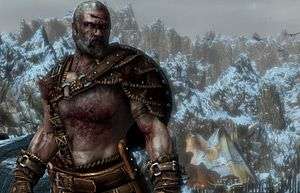 When the Game of Thrones TV series was announced, I, like a lot of people, was very excited. I had never read the books, hell, I hadn’t even heard of the series before, but it looked pretty spectacular, and reports from America claimed it was fairly close to the source material. Two series later and it’s still one of the best TV shows in years. Its success has led to many people – my mother included – to rush out and buy the books. As the series became a franchise, a game was inevitable, just as the outcry from gamers about “another” TV show/film being turned into a game that was going to suck. Well, I’ll let you in on a secret: Game of Thrones is not as bad as you think.
When the Game of Thrones TV series was announced, I, like a lot of people, was very excited. I had never read the books, hell, I hadn’t even heard of the series before, but it looked pretty spectacular, and reports from America claimed it was fairly close to the source material. Two series later and it’s still one of the best TV shows in years. Its success has led to many people – my mother included – to rush out and buy the books. As the series became a franchise, a game was inevitable, just as the outcry from gamers about “another” TV show/film being turned into a game that was going to suck. Well, I’ll let you in on a secret: Game of Thrones is not as bad as you think.
Cleverly, developers Cyanide Studios decided not to give you control of any major characters, and instead wrote an entirely separate story with whole new characters set around the start of the first book. You play as two characters: Mors, a knight of the Night’s Watch, the band of outlaws and warriors tasked with protecting The Wall and everyone south of it from the dangers lurking beyond, and Alester, a red priest of the God Rh’llor, returning from his exile to the Free Cities to bury his father. If you’re already lost, then this release might not be for you; it’s clear that the developers were sticking close to the source material to appeal to fans of the series. Still, if you just let the lore wash over you and accept what’s thrown at you, it’s not too hard to follow.
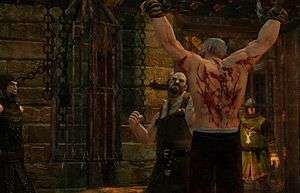 The stories of the two men both start off a little slow, particularly Mors’, since the initial few hours of his story revolve around patrolling the Wall and dealing with Wildlings and suchlike. It’s actually fairly dull stuff, designed as a particularly lengthy tutorial, which is useful, but makes the first few hours a drag. Power through it, however, and you’ll find a magnificent tale of intrigue, deceit and violence that feels perfectly at home in the Game of Thrones universe. It’s practically impossible to talk about it without spoiling the story, but believe me when I say that the narrative is absolutely superb, and at moments had me crying out in anguish and cursing men’s names beneath my breath.
The stories of the two men both start off a little slow, particularly Mors’, since the initial few hours of his story revolve around patrolling the Wall and dealing with Wildlings and suchlike. It’s actually fairly dull stuff, designed as a particularly lengthy tutorial, which is useful, but makes the first few hours a drag. Power through it, however, and you’ll find a magnificent tale of intrigue, deceit and violence that feels perfectly at home in the Game of Thrones universe. It’s practically impossible to talk about it without spoiling the story, but believe me when I say that the narrative is absolutely superb, and at moments had me crying out in anguish and cursing men’s names beneath my breath.
Perhaps I’m getting ahead of myself. First off, you’ve got the task of choosing your character class. While both characters can use every type of weapon and armour, there are three classes per character that specialise in specific weapons, and each class offers up a different skill tree to suit those weapons. So, if you choose to play as a Magnar with Mors (as I did), you’ll specialise in attacks that deal out huge amounts of damage when dual-wielding axes and daggers, designed to get your enemy bleeding and exploit that open wound. For Alester, however, I chose to play as a Water Dancer, who uses one-handed swords to cripple enemies and deal quick strikes. Once you’ve chosen your class, you can put points into your weapon and armour stats, although you’re given a x2 bonus on weapons and armour associated with your class, so it’s likely that you won’t bother levelling up anything else.
With points assigned, you’re given the option to unlock some skills. These range from cutting enemies open to attacking everyone in a certain radius, or even skills that buff your damage or energy recovery. There’s plenty of choice on offer, and you’ll likely unlock every skill before the end, so there’s plenty of opportunity to try out new tactics as you progress. After that’s dealt with, you give your character some traits, both good and bad. The traits have to balance before you progress, so you have to decide what you need and what you can live without; if you want a higher critical hit chance, you might have to suffer from being a profuse bleeder, leaving you seriously open to attack if the enemy opens up a wound on you. It’s an interesting little system, but most of the effects are so miniscule that you’ll barely notice them when playing. The amount of customisation on offer is pretty decent, and you can really mould your character to your own play style, but the number of options might (and I have witnessed this) put some newbies to the RPG genre off before they even start.
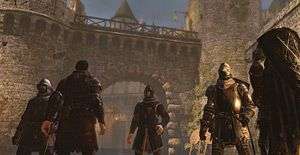 As you might expect with an RPG such as this, you spend most of your time either fighting or talking. The combat has been rather negatively received by many people, but I can’t really understand why. It plays a lot like Knights of the Old Republic; you queue up your actions and watch as your character carries them out. You can slow down combat with a quick bash of the space bar, bringing up all your available actions and also turning any dialogue currently being spoken into a demonic roar as you line up your attacks.
As you might expect with an RPG such as this, you spend most of your time either fighting or talking. The combat has been rather negatively received by many people, but I can’t really understand why. It plays a lot like Knights of the Old Republic; you queue up your actions and watch as your character carries them out. You can slow down combat with a quick bash of the space bar, bringing up all your available actions and also turning any dialogue currently being spoken into a demonic roar as you line up your attacks.
It allows you to sort out your attacks easily and without getting completely destroyed while doing so, although there is a glaring issue in that you can’t cancel an order, so if you accidentally click the wrong action then you’ve wasted time and your character’s energy, and possibly even got them killed. Worse still, you can only queue up three attacks at a time, so if you’ve been clicking an enemy like a madman trying to get your character to attack him, you’ll likely use up all your spaces and have to wait while your character goes through the attack animations.
Both characters have their own special abilities to go with their class based skills. Mors has his trusty dog sidekick, who you can level up to assist in battles either by crippling enemies or buffing stats, and eventually can even perform a throat lunge, doing a huge amount of damage to enemies without shields. Alester doesn’t have a dog, but a God, on his side, and can use the Rh’llor’s powers (as well as some oil) to set his sword ablaze, dazzle enemies so they attack each other, and revive team-mates. These special abilities are pretty damned useful, and add an extra layer to the combat beyond your class-based actions.
 That said, the combat is still a little repetitive, particularly once you’ve gained a certain set of skills. It mostly boils down to making enemies bleed or knocking them down and exploiting the opportunity. There is the incentive to mix up your weapon choices by allowing you two weapon sets that can be switched between midway through combat, and each weapon being useful against different types of armour, but, for the most part, if you pour points into your favourite weapon, you can get away without needing to switch weapon sets at any point in the game. Which raises another point; Game of Thrones is actually pretty easy, right up until the end where the difficulty ramps up massively and completely out of nowhere. All in all, the combat is fairly solid, but the lack of cancellation, the small attack queues and the difficulty of combat prevent it from being something truly interesting.
That said, the combat is still a little repetitive, particularly once you’ve gained a certain set of skills. It mostly boils down to making enemies bleed or knocking them down and exploiting the opportunity. There is the incentive to mix up your weapon choices by allowing you two weapon sets that can be switched between midway through combat, and each weapon being useful against different types of armour, but, for the most part, if you pour points into your favourite weapon, you can get away without needing to switch weapon sets at any point in the game. Which raises another point; Game of Thrones is actually pretty easy, right up until the end where the difficulty ramps up massively and completely out of nowhere. All in all, the combat is fairly solid, but the lack of cancellation, the small attack queues and the difficulty of combat prevent it from being something truly interesting.
When you’re not fighting, you’re probably having a chat with the huge cast of characters. There’s only about three characters who you’ll recognise from the series, however, in the form of Lord Commander Mormont, the commander at the Wall, Queen Cersei, who has a pretty major place in the plot, and Varys, everyone’s favourite eunuch who pops up at certain points in the story and rapidly becomes the best character in the game, as he was in the series. The conversations feature the ever-popular feature of a conversation wheel, offering you a smattering of options to choose from and make your own decisions about what’s said and done. This leads to some moral decisions that you can make but, to be perfectly honest, many of these are largely pointless.
The choice system also makes a decidedly ugly appearance during the final moments, where you’re quite blatantly given the choice of which character’s ending you want to see. With absolutely no air of subtlety about it, it becomes clear that Game of Thrones hasn’t been tracking which character’s beliefs you’ve been siding with, and instead of making the decision for you based on how you’ve played, just throws the option out to you and makes you pick. It’s not like you can even plan when this event will happen and save beforehand so that you can reload and see the other ending later, either. It’s a hugely frustrating moment after spending hours playing a specific way to discover that the ending boils down to a simple button press.
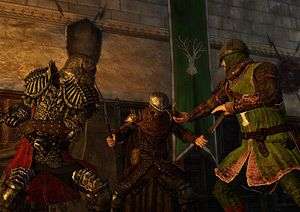 Yet, there are times when the dialogue and the choices aren’t quite so blatant, and that’s where Game of Thrones shines. There’s one side-quest in particular that strikes me as absolutely superb. It begins simply enough: a peasant woman wants you to persuade a noble lord who has fallen in love with her to come and visit her to discuss their illegitimate child. You can do this quite easily, or you can start to dig deeper. If you dig deeper, you discover there’s a whole lot more to the story, and each party has their own secrets and agendas that slowly become apparent as you keep talking to them and exploring the area. It’s a fantastic example of how Game of Thrones could have been, but sadly these moments are too few and far between.
Yet, there are times when the dialogue and the choices aren’t quite so blatant, and that’s where Game of Thrones shines. There’s one side-quest in particular that strikes me as absolutely superb. It begins simply enough: a peasant woman wants you to persuade a noble lord who has fallen in love with her to come and visit her to discuss their illegitimate child. You can do this quite easily, or you can start to dig deeper. If you dig deeper, you discover there’s a whole lot more to the story, and each party has their own secrets and agendas that slowly become apparent as you keep talking to them and exploring the area. It’s a fantastic example of how Game of Thrones could have been, but sadly these moments are too few and far between.
The final major gameplay element is playing as Mors’ dog, which shifts the action into a first-person view and allows the player to follow scents in the world to go to the next objective, or track down hidden items. You can also scout ahead for enemies, and rip their throats out if they’re alone, simply by hammering left-click like you’re having a fit. These sections are usually short and simple, and sometimes can be ignored since it’s often fairly obvious where to go (usually because the objective markers are still showing on the radar). The camera is super-sensitive though, and that goes for the third-person view as well, which is really annoying and can’t be adjusted at all (trust me, I tried). Still, exploration in general is pretty good – the environments themselves have plenty to discover, and the map and radar do a good job of making sure you know where you’re going.
 |
 |
 |
 |
 |
 |
Graphically, the environments are a little hit and miss. Pretty much everywhere in the north of the world is covered in snow and littered with run-down stone buildings, which are pretty dull to behold and never get much more interesting. Down south it’s a different matter; the areas are bright and colourful, and a joy to wander round as you move between objectives. It brings out the cultural differences well, but the art style does mean that the sections in the north are generally quite boring, as you trudge through seemingly endless snowy forests. The characters and models have some pretty detailed textures, but the actual models themselves are fairly blocky and are prone to clipping through their armour, along with some pretty poor lip-syncing. In fact, animations across the board are fairly poor outside of cutscenes, with every character having the same idle animation, and only a handful of combat animations based on the weapons they’re currently wielding. It’s pretty uninspiring stuff, and definitely a low point.
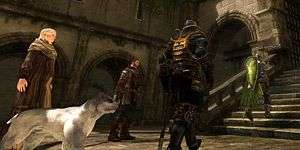 But it’s not the lowest point. Yes, worse than the rather lame models and animations is the voice acting. With a cast so huge, there were bound to be a few performances that sounded phoned in, but Game of Thrones feels more like a mass conference call. Almost everyone, even the main characters, delivers their lines slowly and without emotion, save for a couple of interactions between Alester and Mors where things get heated and they start growling at each other a little louder.
But it’s not the lowest point. Yes, worse than the rather lame models and animations is the voice acting. With a cast so huge, there were bound to be a few performances that sounded phoned in, but Game of Thrones feels more like a mass conference call. Almost everyone, even the main characters, delivers their lines slowly and without emotion, save for a couple of interactions between Alester and Mors where things get heated and they start growling at each other a little louder.
Worse yet, of the three characters who made it into the script, only two of them have their TV counterparts voicing them, and only one of them delivers a performance worthy of note. Conleth Hill’s performance of Varys is as wonderful and slightly creepy in game as it is in the show, and any conversation with him is a joy to listen to. It’s a shame there are only two or three of them, and that no one else gave as much as he did. The voice-work isn’t bad, it’s just emotionless and bland, and a real shame when there’s so much dialogue to get through. Oh, and try and spot the rather haphazardly thrown-in cameo of series author George R. R. Martin, whose American accent is horrifically out of place when every single other character speaks with an English accent.
Yet, despite my complaints about the graphics and vocal work, I truly enjoyed my time with Game of Thrones. The story is so brilliantly put together, and there are some superb moments scattered throughout; if you battle through the average combat system and menagerie of other problems you come out with a solidly put together title that’s a really interesting experience, and works incredibly well with the source material. With some more time, and probably a larger budget, the graphics could have been improved and the voice-acting performed to a higher standard, but overall Game of Thrones is a good game that should definitely be checked out by fans of the series or those interested in it.
Pros- Absolutely fantastic story, utilising the source material wonderfully
- Moments of brilliance scattered throughout
- Great level of detail in textures
- Plenty of customisation for classes and play-styles…
- …But that could scare off newbies to the genre
- Takes a while to really get going
- Poor character models and dull, repeated animations
- Boring and emotionless voice work (save for one character)
If Game of Thrones had been made around seven years ago, we would have found the graphics to be great, the story to be ahead of its time, and the gameplay to be spot on. But in today’s world of hyper-realistic graphics and smooth animations, as well as an increasing interest in quality voice-acting, the game falls flat. Forget the technical side, however, and you’re given a seriously interesting and exciting story, a customisation system with plenty of scope, and a number of moments throughout that will stick with you far beyond the end credits. Game of Thrones may not be a looker on the outside, but inside it has heart, soul, and some brilliant thoughts it wants to share with you.
Last five articles by Ric
- Playing Rhiannon, With Rhiannon
- The Hidden Controversies of 2015
- Best of 2015: Tell No Tales
- Best of 2015: A Good Walk Spoiled By John
- Best of 2015: My Summer As A Drug Dealer



















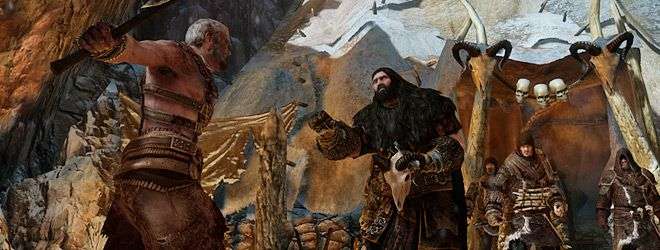
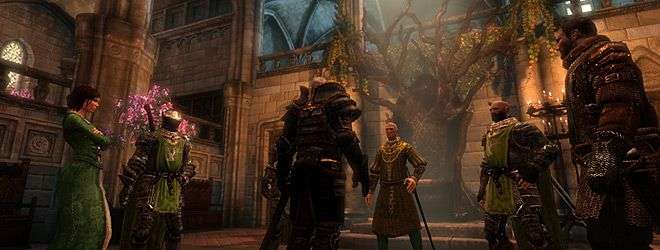
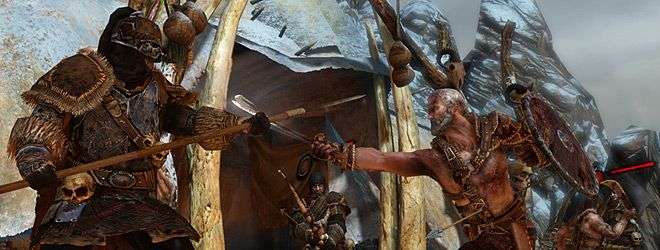






It doesn’t sound too bad, though mostly because if they kept up those kind of side-quests (where you’re rewarded more for digging deeper, not the ones with prozzies) then it could have been a far more subtle adventure!